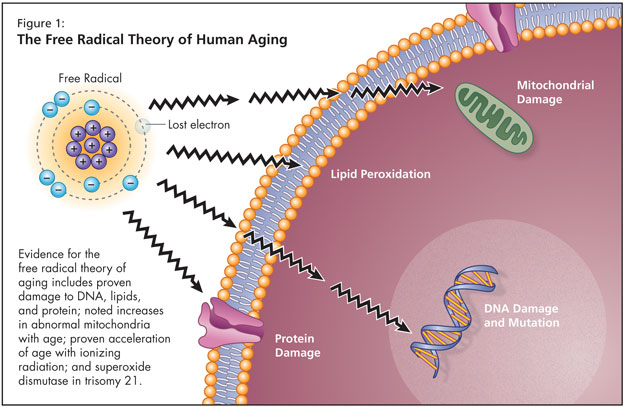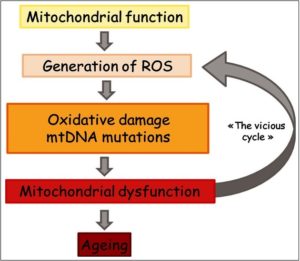Are We Killing Ourselves With Antioxidants? (Why the Free Radical Theory is flawed)
Summary: The mitochondrial free radical theory of aging suggests that antioxidant supplements can repair the damage caused by free radicals. However, this practice is contradicted by a large body of evidence which shows that antioxidant supplements are often harmful. Researchers are discovering more effective ways to improve health by clearing our mitochondrial damage caused by free radicals.[Author: Brady Hartman. This article first appeared on LongevityFacts.]
A growing body of evidence shows that for otherwise healthy people, antioxidant supplements are a waste of money, and could ruin your health.
Free Radical Theory Disproven
Researchers have debunked a key tenet of the Free Radical Theory of Aging, which implies that if we eat antioxidant supplements, we can block the free radicals that damage our mitochondrial DNA.
While the Free Radical Theory of Aging makes sense to most people, time and again, research studies show that antioxidants don’t make us healthy. In fact, they have the opposite effect. Doctors are warning otherwise healthy patients not to consume excessive antioxidant supplements. A practice that, for people with an otherwise healthy diet, can lead to ill health.
Tenets of the Mitochondrial Free Radical Theory of Aging
The MFRTA implies that consuming antioxidant supplements – such as vitamin A, vitamin C, vitamin E, beta-carotene and Superoxide dismutase -will slow the process of aging. To back up their claim, supporters of the theory frequently cite the antioxidants found in many foods, especially in the proven health benefits of fruits and vegetables.
While no one doubts that fruits and vegetables are healthy, recent studies show that antioxidant supplementation has no effect and some supplements can even increase mortality.
For example, a systematic review published by the Cochrane group showed that the overall risk of death was higher in men and women who supplemented with a high dose of vitamin E than in those who didn’t. The people in these studies were taking 400 IU or more of the supplement daily.
In another example, the same Cochrane review found that large doses of vitamin A and beta-carotene increased the risk of death in study participants. Taking a large dose of either of these two supplements was found to be especially unhealthy for smokers or former smokers.
Antioxidant True Believers
The mounting evidence against antioxidant supplements hasn’t deterred supporters of the Free Radical Theory of Aging. Google’s chief engineer Ray Kurzweil takes 100 supplements a day, in a bid to live forever.
The fact that repeated studies show that antioxidant supplements don’t improve health, and sometimes hurt us, hasn’t deterred proponents of the MFRTA. Supporters of the theory claim that the negative test results are explained by hormesis. Eating antioxidant supplements can lead to a decrease of normal biological response to free radicals and result in a more sensitive environment to oxidation.
Other supporters of the MFRTA dismiss the evidence like the type published by the Cochrane group, by pointing out that the studies used synthetic vitamin supplements as primary nutrient sources. Since many different substances operate synergistically in antioxidant defense, a person on an antioxidant supplement regimen may require a more sophisticated approach to obtain a health benefit.

Strengths of Mitochondrial Free Radical Theory of Aging
Scientists have long known that mitochondrial dysfunction causes aging. The MFRTA has been discredited as a whole because the experimental evidence failed to support a central claim of the theory. The research community still believes many of the tenets of the MFRTA, as follows:
Three accepted facts about mitochondria and free radicals:
- The leading opinion among researchers is that free radicals cause damage to our mitochondrial DNA, which in turn causes ill health and accelerates the aging process.
- Scientists also agree that damaged mitochondria contribute to a host of human diseases. Researchers are particularly interested in two areas: the role of mitochondria in cancer, as well the role the mitochondria plays in chronic conditions of aging, including type 2 diabetes, heart disease, Alzheimer’s and Parkinson’s disease
- Researchers also agree that the body’s natural antioxidant molecules quench free radicals.
- Free radicals aren’t the bad guys they were once portrayed to be. Free radicals have multiple roles within the cell, sometimes beneficial, at other times destructive.
Mitochondrial Dysfunction With Age
Mitochondrial dysfunction is a key hallmark of aging. As we grow older, our mitochondria decline both in quantity and quality. Researchers suspect this decline is partially responsible for a general overall decline, including areas such as hearing, intellect, lower muscle strength and endurance.
Not only does the quantity of our mitochondria decline as we age, but the remaining ones also become less efficient, generating less energy, and while producing more toxic waste called reactive oxygen species (ROS). As we age, our cell is making less anti-oxidant defenses, such as ubiquinone, glutathione, and superoxide dismutase. Free radicals are not a problem for young people whose bodies manufacture plenty of anti-oxidants, but as our defenses decline in old age, oxidative damage takes a toll on our cells.
All Free Radicals Aren’t Created Equal
Not all free radicals are bad. Some reactive oxygen species are used as necessary signals within the cell. Other ROS promote repair rather than damage. For example, scientists don’t know exactly why, however, they have observed that the free radicals generated by our aging mitochondria produce accumulating damage, but exercise generate free radicals that repair the body and improve health. Taking anti-oxidant supplements has been shown in repeated clinical trials not too helpful. Researchers believe it is because anti-oxidant supplements interfere with the signaling functions of reactive oxygen species.
Although mitochondria can become damaged by free radicals, they mostly show their age in mutations of their DNA, called mitochondrial DNA or mtDNA for short.

Mitochondrial Free Radical Theory of Aging
A generation ago, researchers subscribed to the commonly held Mitochondrial Free Radical Theory of Aging. While the theory, has long since been discredited by the scientific community, more supportable theories have sprung up to take its place. The Mitochondrial Free Radical Theory of Aging model was built on a flawed theoretical foundation and met its death when experiments showed that antioxidant supplements don’t extend lifespan. In fact, they sometimes shorten it.
The theory has gone by many names over the years, including the “Mitochondrial Free Radical Theory” and the “Free Radical Theory of Aging.” Because these titles describe the same concept, this report uses the all-inclusive term “Mitochondrial Free Radical Theory of Aging,” or MFRTA for short.
Free Radical Damage
The essence of the MFRTA is that aging is caused by oxidative damage originating from within the mitochondria. As the powerhouse of the cell, the mitochondrion produces reactive oxygen species (ROS) as toxic waste. Also known as free radicals, ROS damages large molecules, such as proteins, DNA, and lipids. Left to accumulate, ROS destroys many vital components of the cell. Mitochondria have many defenses against the adverse effects of ROS, including the enzyme superoxide dismutase (SOD2), glutathione, peroxiredoxins, and thioredoxin.
The central tenet of the Mitochondrial Free Radical Theory of Aging was that by consuming antioxidant supplements, we could counteract the free radicals and turn off aging.
Although the MFRTA has been discredited, scientists firmly believe that mitochondria play a role in aging. In other words, while scientists have long known that mitochondrial genomic dysfunction causes aging, the theory failed to support the evidence, and have come up with better theories to support the evidence.
The Vicious Cycle
The theory possessed an elegant feedback loop, in which free radicals caused damage to mitochondrial DNA and upset a careful balance between free radical production and enzymatic ROS scavenging. The damage resulting from reactive oxygen species fed upon itself in a feedback loop and eventually led to a tipping point, at the cell’s eventual death. The Mitochondrial Free Radical Theory of Aging was a compelling model that made sense to many and attracted hordes of followers.
Attacks on The Mitochondrial Free Radical Theory of Aging
The Mitochondrial Free Radical Theory of Aging was in trouble from the day it was announced. For example, researchers showed that mutations which reduced antioxidant defenses and increased ROS production tended to increase, rather than decrease, the longevity of worms.
According to the Mitochondrial Free Radical Theory of Aging, stopping free radicals helps to improve health. Reality trumped theory and researchers found that the story to be far more complicated. ROS increases cell growth and cellular communication. Strangely, as the defenses against ROS increase, cancerous cell death decreases.
In another example, researchers pointed out that naked mole rats – or rodents about the size of mice, yet hairless and thus far more naked – live about eight times longer than their fur-bearing, cheese-eating brethren despite having reduced antioxidant defenses and increased oxidative damage.
The worm and rodent evidence wasn’t enough to quash the widely popular MFRTA. It met its death knell, however, when Bjelakovic showed that antioxidant supplements did not increase human longevity. Bjelakovic and colleagues analyzed the results of 78 antioxidant studies that were published between 1977 and 2012, involving nearly participants. Bjelakovic concluded that antioxidant supplements do not reduce all-cause mortality nor extend lifespan. In fact, the researchers found that some antioxidants, such as beta-carotene, vitamin E, and higher doses of vitamin A, actually increase mortality.
MFRTA was a nice try, but it fell apart on closer examination.
Bottom Line
Once considered an academic backwater, mitochondrial research has become a hot topic of research, with the principal areas of interest including cancer, aging and health, evolution and repairing damage to mitochondrial DNA. In a related article, you can learn more about the mitochondria and its role in human disease and evolution.
Researchers have made considerable progress in understanding the role that the lowly mitochondria play in cancer, and are looking for ways to interfere with the process to cure malignant tumors. Learn about the new developments in the partnership between mitochondria and cancer in this related article.
Having dismantled the MFRTA, researchers have discovered new facts about the role the mitochondria plays in chronic diseases of aging. As we age, our mitochondrial DNA becomes damaged through mutations that lead to increasing dysfunction. It needn’t be this way, as mitochondria can clone at will at produce healthy DNA. New research is showing fresh insights into the role of mitochondrial DNA in human health and aging, and scientists have made progress reversing the mitochondrial damage in animal experiments.
Related article: Learn more about free radicals in this article.
Help Us Spread the Word
Please share this post and help us spread the word. All it takes is one simple click on any of the social media links on this page.
References
- , , , , . Antioxidant supplements for prevention of mortality in healthy participants and patients with various diseases. Cochrane Database of Systematic Reviews 2012, Issue 3. Art. No.: CD007176. DOI: 10.1002/14651858.CD007176.pub2.
- The Alpha-Tocopherol, Beta Carotene Cancer Prevention Study Group “The effect of vitamin E and beta carotene on the incidence of lung cancer and other cancers in male smokers.” (1994). New England Journal of Medicine. 330 (15): 1029–35. PMID 8127329. doi:10.1056/NEJM199404143301501.
- Omenn GS, Goodman GE, Thornquist MD, Balmes J, Cullen MR, Glass A, et al. “Effects of a combination of beta carotene and vitamin A on lung cancer and cardiovascular disease.” (1996). New England Journal of Medicine. 334 (18): 1150–5. PMID 8602180. doi:10.1056/NEJM199605023341802. Alternate link.
- Bjelakovic G, Nikolova D, Simonetti RG, Gluud C. “Antioxidant supplements for prevention of gastrointestinal cancers: a systematic review and meta-analysis.” (2004). Lancet. 364(9441): 1219–28. PMID 15464182. doi:10.1016/S0140-6736(04)17138-9.
- Miller ER III, Pastor-Barriuso R, Dalal D, Riemersma RA, Appel LG, Guallar E. “Meta-analysis: High-dosage vitamin E supplementation may increase all-cause mortality.” (2005). Annals of Internal Medicine. 142 (1): 37–46. PMID 15537682. doi:10.7326/0003-4819-142-1-200501040-00110.
- Heart Protection Study Collaborative Group.“MRC/BHF Heart Protection Study of antioxidant vitamin supplementation in 20,356 high-risk individuals: a randomised placebo-controlled trial”. (2002). Lancet. 360 (9326): 23–33. PMID 12114037. doi:10.1016/S0140-6736(02)09328-5.
- Age-Related Eye Disease Study Research Group. “A Randomized, Placebo-Controlled, Clinical Trial of High-Dose Supplementation With Vitamins C and E and Beta Carotene for Age-Related Cataract and Vision Loss: AREDS Report No. 9.” (2001). Archives Ophthalmology. 119 (10): 1439–52. PMC 1472812. PMID 11594943. doi:10.1001/archopht.119.10.1439.
- Calabrese V, Cornelius C, Trovato A, Cavallaro M, Mancuso C, Di Rienzo L, et al. “The hormetic role of dietary antioxidants in free radical-related diseases.” (2010). Current Pharmaceutical Design. 16 (7): 877–83. doi:10.2174/138161210790883615.
- Park CB, Larsson NG. Mitochondrial DNA mutations in disease and aging. Journal of Cell Biology 2011;193:809–818.
- Alexeyev, M., Shokolenko, I., Wilson, G., and LeDoux, S. The maintenance of mitochondrial DNA integrity—critical analysis and update. (2013). Cold Spring Harbor perspectives in biology, 5(5), a012641.
Disclaimer
Diagnosis, Treatment, and Advice: This article is intended for educational and informational purposes only and is not a substitute for professional medical advice. The information provided in this report should not be used during any medical emergency or for the diagnosis or treatment of any medical condition. Consult a licensed physician for the diagnosis and treatment of any and all medical conditions. Call 911, or the equivalent emergency hotline number, for all medical emergencies. As well, consult a licensed physician before changing your diet, supplement or exercise programs. Endorsements, Photos & External Links: This article is not intended to endorse companies or other organizations, or their products. Links to external websites, mention or depiction of company names or brands, are intended for illustration only and do not constitute endorsements.


9 Replies to “Are We Killing Ourselves With Antioxidants? (Why the Free Radical Theory is flawed)”
Comments are closed.